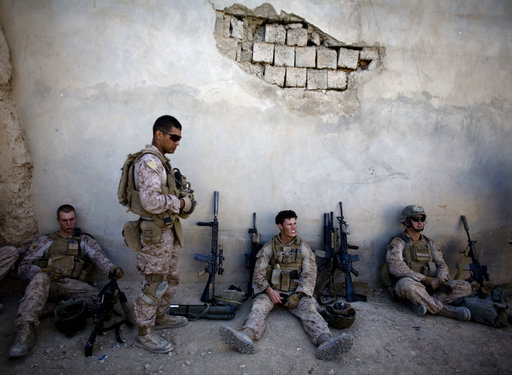Afghanistan’s President Ashraf Ghani hailed the U.S. for its support in what he called a “joint struggle” against terrorism.
It comes as the White House signaled it would shift tactics in its effort to defeat the Taliban, as part of America’s longest war.
CGTN’s Roee Ruttenberg reports.
The president laid out his priorities for Afghanistan in what he called a “new strategy for South Asia”.
Less than 24 hours later, the Afghan Taliban condemned White House plans for a boost in U.S. troops being sent to the country.
“As long as there is even one American soldier in our country and their leaders follow up with the war approach, we – with a strong spirit and full determination – will continue our Jihad,” Zabihullah Mujahid, Spokesman for Afghan Taliban, said.
The top U.S. military commander in the region confirmed that more U.S. troops were already on their way. It’s still unclear in what capacity, and how many, but the Afghan government in Kabul has aldready welcomed the announcement.
Back in Washington, U.S. Secretary of State Rex Tillerson was clarifying Trump’s plans. He said decisions will be decentralized, moving from Washington to the battlefield.
“The President has been quite clear that what will be different this time is he has empowered our military commanders on the ground to make more timely decisions to conduct battlefield operations based upon the conditions on the ground, with the battle plans Secretary of Defense Mattis will be approving. That is going to change the dynamics on the ground considerably,” Tillerson said.
Tillerson said the U.S. would be open to peace talks, with “moderate elements” of the Taliban. He said India would be an important partner toward that goal- a distinction welcomed by New Delhi.
Tillerson saved his harshest language for Pakistan, which he accused of “harboring terrorists,” He said Islamabad has been forewarned.
Pakistan’s foreign minister denied the accusation, and neighbor China came to the country’s defense.
“Pakistan is on the front line in the struggle against terrorism, has actively made efforts and great sacrifices to combat terrorism for years and has made important contributions to safeguarding regional and global peace and stability. We believe that the international community should fully recognize Pakistan’s anti-terrorism efforts,” Chinese Foreign Minister Spokesperson Hua Chunying said.
Tillerson also accused Russia of selling weapons to the Taliban, in violation, he said, of international norms. Moscow has already called such accusations “groundless.” On Tuesday, at least one Russian official was quoted by local media as saying he didn’t think the U.S. new strategy in Afghanistan will lead to any significant changes in the country.
Shuja Nawaz discusses Afghanistan and Pakistan’s reactions to President Trump’s speech
CGTN’s Mike Walter spoke with Shuja Nawaz, a distinguished fellow at the Atlantic Council’s South Asia Center, about Afghanistan and Pakistan’s reactions to President Trump’s announcement of his “new strategy for South Asia”.
 CGTN America
CGTN America
 FILE – In this Nov. 3, 2011 file photo, Marines of with India company, 3rd Battalion 5th Marines, First Marine Division, take a break during a patrol in Sangin, south of Kabul, Afghanistan. Reversing his past calls for a speedy exit, President Donald Trump recommitted the United States to the 16-year-old war in Afghanistan, declaring Monday, Aug. 21, 2017 U.S. troops must “fight to win.” He pointedly declined to disclose how many more troops will be dispatched to wage America’s longest war. (AP Photo/Dusan Vranic)
FILE – In this Nov. 3, 2011 file photo, Marines of with India company, 3rd Battalion 5th Marines, First Marine Division, take a break during a patrol in Sangin, south of Kabul, Afghanistan. Reversing his past calls for a speedy exit, President Donald Trump recommitted the United States to the 16-year-old war in Afghanistan, declaring Monday, Aug. 21, 2017 U.S. troops must “fight to win.” He pointedly declined to disclose how many more troops will be dispatched to wage America’s longest war. (AP Photo/Dusan Vranic)
